From September 2019 in McAllen, TX
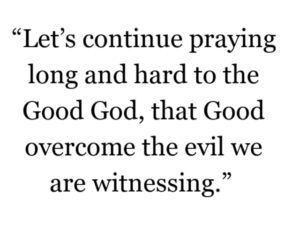 Those of us, Pat Shanahan, Bobby English and Mary Alice McCabe who have been at the Humanitarian Respite Center during the past few weeks have been witnessing a very disturbing situation. The number of refugee/immigrant families being released from detention facilities and then sent to our shelter has notably decreased. Somedays we welcome 150, other days, 50 or less. Only about 5% of those detained by ICE are allowed into the USA and then appear at the Respite Center. Where are they sending the other 95% of the families who we know were in detention? They have been sent back to Mexico, turned out on the streets of very dangerous Mexican border cities and told to wait there if they wish to appear for an immigration court hearing in 2 months! This is one crueler, illegal decision of the Trump administration.
Those of us, Pat Shanahan, Bobby English and Mary Alice McCabe who have been at the Humanitarian Respite Center during the past few weeks have been witnessing a very disturbing situation. The number of refugee/immigrant families being released from detention facilities and then sent to our shelter has notably decreased. Somedays we welcome 150, other days, 50 or less. Only about 5% of those detained by ICE are allowed into the USA and then appear at the Respite Center. Where are they sending the other 95% of the families who we know were in detention? They have been sent back to Mexico, turned out on the streets of very dangerous Mexican border cities and told to wait there if they wish to appear for an immigration court hearing in 2 months! This is one crueler, illegal decision of the Trump administration.
This new immigration policy called the Migrant Protection Protocol was implemented in mid-July all along the Texas border. In our eastern area of the Texas Border, The Rio Grande Valley, this means that 100’s of Central American families, without clothes, or money or shelter have no choice but to camp out at the base of the international bridge between Brownsville -Texas and Matamoros-Mexico.
Last Friday, Mary Alice had an opportunity to go over the bridge to see for her in what conditions these poor people are living. She went with a non-profit group of volunteers called TEAM BROWNSVILLE who bring meals twice daily to the immigrants camped on the other side. They met behind the Brownville Bus Station where 20 or more volunteers gather and organize a caravan of carts bringing food, diapers, toiletries, blankets. The march over the bridge takes about 20 minutes.
What she saw on arriving on the Mexican side was deplorable. Over 500 men, women and children outdoors, with no food, water or basic necessities. And no shade in the blazing sun registering 102 degrees. She counted 2 outdoor toilets for 500 people. She saw kids without shoes, and mothers sitting on curbs nursing their babies. About half of the families had small camp tents provided by TEAM BROWNSVILLE; others, who sleep out on the ground begged the Team to get them a tent. The only bath available to them is in the filthy Rio Grande which passes close by and is filled with chemicals from the maquiladoras (factories). Babies and clothes are also washed in this river.
When the Team arrived, two long lines of 100’s had already formed in wait for a meal. People told her that they had no choice but to wait there in the camp because they had no money to travel or find shelter, and that they feared leaving the camp to go into the streets of Matamoros, a city controlled by the violent drug cartels that rape, assault and kill. Also they hold on to the hope that in 2 months they will be granted entry into the USA. One man said: “I have no choice –either wait here as a last hope or go back to my country and be killed by the gangs.“
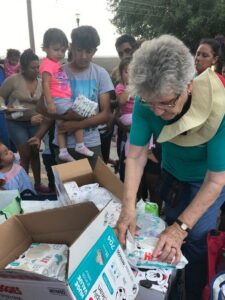
Catholic Charities in McAllen is sharing donations to help Team Brownsville in responding to the needs of the families on the bridge.
For us, Sisters of Notre Dame de Namur, the call seems to be as always – to follow the poor in the most abandoned places. So in future months we see ourselves dividing our time and efforts between the Humanitarian Respite Center and the Brownsville- Matamoros Bridge. Let’s continue praying long and hard to the Good God, that Good overcome the evil we are witnessing.
From September 2019 in Arizona
Liane del Suc, SNDdeN:
Thursdays bring an ICE busload of people who have been processed at the border in Yuma, Nogales, or Agua Prieta, AZ to a small church in Phoenix where an interfaith community of volunteers provides the sometimes first safe, respite place as arrangements are being made for bus or plane transport to their families or sponsors in the US. Each day of the week, another small church community offers support. All receive food, showers, backpacks, clothing and help for the next leg of their journey.
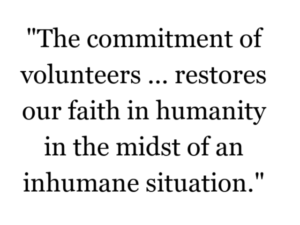 Approximately 30 men, women and children arrive with only the clothes on their backs, ankle bracelets to monitor their whereabouts, and the hope that they will now see their relatives. The stories of their journey are heart-wrenching and their need for simple human contact is great. Many are coming from Guerrero, Mexico where violence and fear abound. The numbers from Central America are down as they are caught in Mexico, not having asked for asylum in the first country they entered.
Approximately 30 men, women and children arrive with only the clothes on their backs, ankle bracelets to monitor their whereabouts, and the hope that they will now see their relatives. The stories of their journey are heart-wrenching and their need for simple human contact is great. Many are coming from Guerrero, Mexico where violence and fear abound. The numbers from Central America are down as they are caught in Mexico, not having asked for asylum in the first country they entered.
On the border in Nogales, Mexico, construction is underway of a new building for the Kino Border Initiative services and it should open in December. This will increase the number of people served at one time, add a clothing room and dormitories. Although there are a number of smaller shelters in Nogales, the need is tremendous for those who still have hope that they can get into the US.
The stories about the detention centers are scandalous. Some people have been without food for three days at a center. One mother was sorry her three year old had to experience that; she didn’t think that could happen in the US. Last week, a Romanian father (who speaks several languages) and his son were separated at the border from his wife and daughter. He and his son were given temporary asylum and arrived in Phoenix, but he has no idea where his wife and daughter are, somewhere in Mexico, with no English and no Spanish. His sadness was palpable as he sat alone in a corner for the afternoon.
The commitment of volunteers, week after week, restores our faith in humanity in the midst of an inhumane situation.
From August 2019 in McAllen, Texas
Jean Stanford, SNDdeN:
We would watch people walk off the Border Patrol bus, looking exhausted, having mismatched shoes on their feet, and hair in disarray because the Border Control had taken away their hair ties and shoe laces. We walked with them across the street from the bus station to the Respite Center, saying, “Bienvenidos a los Estados Unidos!”
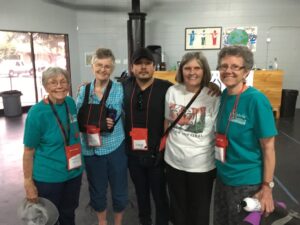
We stand on holy ground together creating community, overcoming obstacles of language and figuring out new ways to communicate, often using pantomime. I would guess and hold up an object needed and they would give “thumbs-up” if it was the wanted item. Sometimes they would hold up a foot for shoe laces. We had hair ties for those who needed them. We were able to get shoes thanks to a generous donation. I learned the universal language known to all of us is “Pampers!”
We spent time at the Respite Center and lunch at the bus terminal where we watched the huge white “no name buses” arrive from the detention centers, and the tired people descend and walk to the Respite Center where they were greeted by the staff, given a brief orientation to the Center, and handed survival bags to guard items needed for the journey. The people relaxed, smiled, and you could see peace descend on their faces. A spirit of joy and hope permeates the Center.
I think that if this experience doesn’t lead to change in consciousness and generate some kind of next step, then I think we are missing the boat.
Denise Curry, SNDdeN:
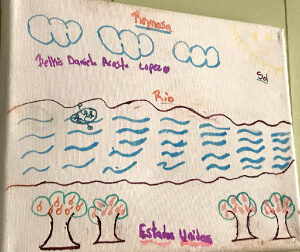
I want to hold up that there were so many good people there volunteering: elderly couples, youth groups, Methodist ministers. Yesterday there was a group called Child Fund, an international group that came to set up a child play area. They’re going to come back to clean the rugs every two weeks and replenish the toys and games. They brought building games, Uno cards, two carpets like in a kindergarten class with ABC’s, a big rug map. Leaders were young, happy, enthusiastic women and men who had a hard time putting the big toy boxes together.
[Sr. Denise had physical limitations because of recent shoulder surgery, but was tireless in her availability for the children. Her smiling presence calmed children who were coming from a long sometimes traumatic journey. She took good care of them and the children took care of Denise, bringing her water when she was thirsty. Denise conversed with the mothers, listened to their stories, and was indeed an Instrument of peace. She had an encouraging word for all: refugees, staff, volunteers. She gave strength for the journey.]
[In the video below, Sisters Betsy Flynn and Denise Curry and fellow volunteer Debbie Polhemus appear and speak briefly about their experiences.]
Betsy Flynn, SNDdeN
A brief note of gratitude to all of you who helped us to come for this experience at McAllen. You have all been with us as we lived these days getting to know the refugee reality and working together to make their time at the Respite Center a time to gather continued strength for the journey, and support for the challenges yet to come.
No sooner back from the Border, we witnessed the tragedy of El Paso, Texas, Dayton, Ohio and the raids and mass arrests in Tennessee which bring once again to the eyes of the world, the violent experience of many who come to the United States seeking hope for the future. While shocked by the overwhelming violence of these events, may we continue to have sustained hope in the power of courageous action of the many to work for change. St. Julie inspires us to trust that “the good God gives us in the right time and place whatever we need.”
From July 2019 in McAllen, Texas
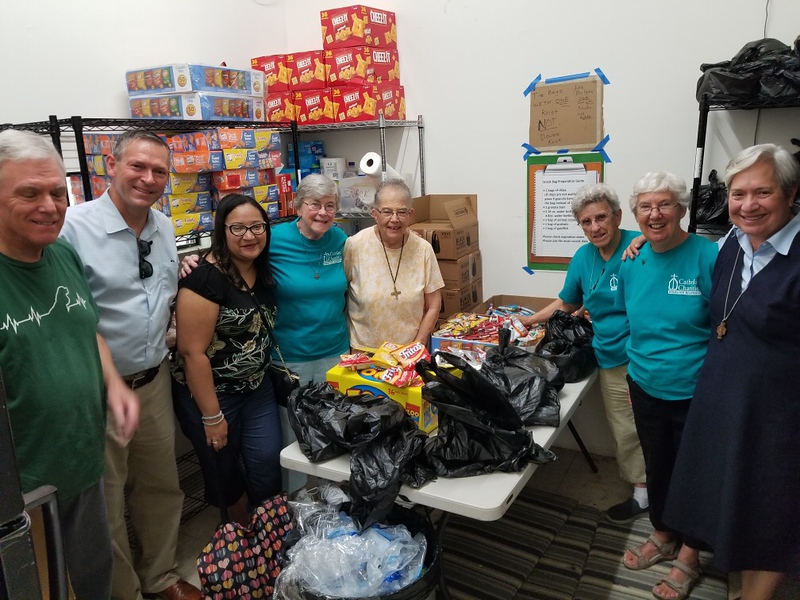
Judith Ward, SNDdeN:
I may have left McAllen, Texas recently however, my heart, spirit and memory are still there! When we started our journey and traveled home we were surrounded by the most appropriate scripture passages. Truly, at this time we were sent by God!
While in Texas, part of my morning prayer each day was directed by Teresa of Avila’s prayer that I/we are God’s eyes, hands, feet and heart on earth now. I prayed that I would truly and deeply SEE the people for whom I was ministering. What I saw was strained, serious faces and eyes transformed into beautiful smiles that lit up their entire faces when greeted with faltering Spanish words. As I encountered folks standing in lines, receiving toiletries or letting me view their travel plans, although we really couldn’t speak to each other we certainly communicated and related with each other. So many were pleased when I responded with enthusiasm about the place to which they were travelling.
One teenage girl had received shoes and shoe laces which she was struggling to insert into the holes. I knelt down before her and gestured that I wanted to help. She was reluctant at first (probably worrying that I was taking them away) but we got the task done. Her father used the light on his cell phone to help me find the holes. Then he took a picture of his daughter and me. It was a powerful moment for us (she had to wipe her eyes, too!).
As we who have ministered at the Respite Center have stories to tell of our experience, I can’t help but think that the Migrants also have stories to share of people who helped and cared about them.
Caroline Sanchez, SNDdeN:
Being part of the daily activity in the Catholic Charities Humanitarian Respite Center was a grace. Contributing to even such small things as preparing food for the migrants' journeys, offering welcome and basic necessities as they entered this safe place that gives shelter, food, clothing and the means to continue on their journeys to family and friends–though keeping us very busy–was a privilege. Interacting with families at the Center or at the bus station as they prepared to leave brought home the reality of their lengthy journeys, the separations some have endured, and the courage it takes to continue.
A world of volunteers seemed to be present during our days in McAllen. Local people, parents and children, fervent church groups, students, college professors, from many states, and some from as far away as Spain.
One group I really admire is called Angry Tias and Abuelas (Aunts and Grandmothers). It is a non-profit group that serves the immigrants in several ways. They meet the ICE buses at the bus station, then escort the immigrants across the street to Catholic Charities, where they are welcomed. When groups of immigrants are ready to start their bus journeys, they sit with each family at the bus station and make sure they have their tickets, show them on a map where they are going, and escort them to the right bus. They do a wonderful service.
I am very grateful that our visioning led us in this direction at this time, in this way, in standing with people made poor as they struggle for adequate means for human life and dignity
Who would have thought that a night club in the center of McAllen, Texas could be called Holy Ground? [The Catholic Charities Humanitarian Respite Center recently expanded to the location, which it is attempting to purchase and renovate.] In the last month it has become a welcoming place for migrants who need resources and a space to plan their next phase of the journey. It boggles my mind to see children enjoying coloring pictures at one former bar area and volunteers at computers helping people get tickets for the next leg of the journey at another former bar area.
 I tried to study the little Spanish I know for weeks before going to McAllen. However, I realized that one word said it all – bienvenidos. Wearing my SND cross, I could see and feel the joy expressed in the ripple of smiles among the immigrants as they arrived from their time at the detention center. Many told stories of their walk for over a month from their countries with their children and few belongings. They have a deep faith in God’s presence with them on the journey.
I tried to study the little Spanish I know for weeks before going to McAllen. However, I realized that one word said it all – bienvenidos. Wearing my SND cross, I could see and feel the joy expressed in the ripple of smiles among the immigrants as they arrived from their time at the detention center. Many told stories of their walk for over a month from their countries with their children and few belongings. They have a deep faith in God’s presence with them on the journey.
One woman I met from Honduras was happy to display her new shoes. She showed me the sandals with a broken strap she was now able to throw away. Her 6 month old daughter also received a pair of pretty pink shoes.
Most of the time I spent in the kitchen making ham and cheese sandwiches. It did not have any glamour, but when I saw the people leaving the center with their bags filled with sandwiches and other goodies, I was glad that they would be fortified for the journey with the food we prepared.
One day in the kitchen with five other people we heard a young child screaming incessantly in the dining room next to us. Each of us expressed concern so Sr. Ellen took a little doll and presented it to the child who instantly stopped. Her mother was finally able to get her to eat. A little miracle occurred.
Ellen Dabrieo, SNDdeN:
I remembered Cana. I was in the sandwich room early Sunday morning. Sr Anne Connolly, coordinator of the same, came in and said Ellen, there is no cook! I responded, "And why are you telling me this?"
She then said that MaryAlice said that I was good in the kitchen. I responded that was true for up to 20 and 40 people, not 200 – 400. Anne responded just go in and see what you can find to make some soup. I will get some of the people to help. We found cut up vegetables in the fridge and a miracle in the freezer: two large pots of frozen soup and some rice. Four Dads from Honduras joined me and together we fed 200 – 400. They gathered together all the hamburger and hot dog rolls. We had many laughs, and they would not let me serve hot soup; they made me wait until the boil produced more flavor! ¡Una rica sopa!
From June 2019 in McAllen, Texas
Peggy Cummins, SNDdeN:
I can still see the long lines of women, men, children, infants from Central America lined up at the center waiting for food, clothing, a shower, medical care, help with travel arrangements, etc. There was no sign of impatience or a lack of gratitude, but what stayed with me was the lack of joy, laughter, conversation…. For me, it gave new meaning to Julie’s words, “Give them what they need for Life.”
We saw the wall near the Rio Grande or I should say walls. There are many types- long, high slats, wires and stone walls. I had a long, friendly talk with a border patrol office while he was sitting in his van. I listened to his perspective and experience at the wall and he listened to mine. I brought up the word compassion and he jumped in to say that he had compassion, too. He said that they bring the migrants to respite centers like the one where I worked. We did agree on two things- a wall will not deter the people from migrating and there is a crisis at the border.
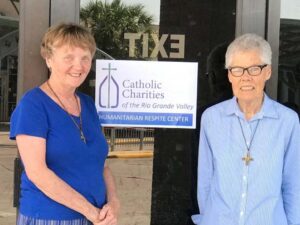
I got involved in the kitchen and distributing food. At one point we ran out of soup, so a young man named Jesus suggested we had more broth to make it go further. Later, we resorted to huge amounts of ramen noodles that actually smelled good. Some days we have so much food because a group brings in the meal, but other days we struggle to get the available food cooked and ready to serve. Today, all of a sudden there were hundreds of mangoes delivered. What a treat. The food line never ends.
I gave out tortillas with another woman. I had the feeling that it was a communion line and we were acknowledging that they all were the Body of Christ. The woman beside me said that she was a Methodist minister and she felt the same way.
From May 2019 in McAllen, Texas
Kathy Gallivan, SNDdeN:
…The image of the hundreds and hundreds of families just released from the Detention Facility and now arriving at the Respite Center will stay with me. The Center was overflowing. …I found myself in the baby room giving out diapers and powdered formula. There were so many babies and pregnant women…
I met a man who had just arrived on the ICE bus and was standing in line to be processed. He was alone, carrying his daughter, Sophia, about 5 months old. He had somehow made his way from Romania and was just so grateful to be in the US.
Most of the families are from Guatemala, El Salvador, Honduras, fleeing through Mexico and then crossing the Rio Grande to be picked up by the Border Patrol and brought to the Detention Facility before they arrive at the Respite Center. About 700 people come through the Respite Center daily.
An image that will stay with me is a young mother who had walked from Guatemala with her ten-week old daughter. Hopefully her husband would come later. She was so grateful for the bottle of water I gave her.
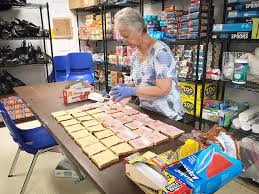
Much of our time was spent in the “Sandwich Room” where we made hundreds and hundreds of ham and cheese sandwiches and prepared bags with water and snacks for the trips the families would finally take, mostly by long bus rides and some by air to finally (hopefully) connect with family or friends here in the US and find a new home.
As with so many times I offer service, I come away feeling blessed and knowing that I have received so much more than I gave.
Jennifer Pierce, SNDdeN:
We met a Honduran mother, Lidia, who arrived at the Respite Center with a broken leg. The ICE-Border Patrol bus had brought her and 50 other refugees to the Center from the Detention Facility. Her leg was wrapped in a make-shift, dirty cast and she was in severe pain. She told us that she had broken her leg eight days earlier in Mexico when she was running from the feared Mexican Immigration agents and she fell in a hole. We asked her how she had managed to escape the Mexican agents with a broken leg? She said: “My son, Carlos, carried me on his back to a safe house several miles away.” We all praised and hugged her 15 year old son, a thin, timid boy sitting by her side. Then we found an old wheelchair for her, and the nurse on duty gave her ibuprofen for her pain. Later, a Respite Center volunteer brought her to a local hospital where she was fitted with a decent cast and crutches. The next day, Lidia and Carlos left us with smiles, “gracias” and renewed hope.
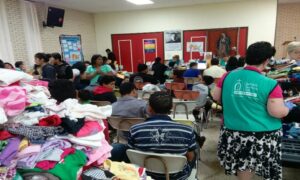
The pain of people’s journeys was easy to see, but their gratitude at being welcomed and given things as simple as hair elastics or a toothbrush was profound.
One day, we got word that visitors were coming to see the Center: Three Senators (not sure who), immigration officials, coast guard officers and the Auxiliary Bishop of Brownsville, TX. The Coast Guard officers stopped in the sandwich room and thanked us for what we were doing. They told us we were entitled to a free rescue!
Mary Alice McCabe, SNDdeN:
One of my jobs was to do the buying of snacks, (chips, crackers, cookies) at Sam’s Club which would be put in the bags that each family takes on their long bus trip. I was wearing my Catholic Charities Disaster Response T- shirt. As I was pushing the cart up to pay, a young woman came up to me, gave me a $100.00 bill and said: “I want to help! I have relatives who are immigrants.”
Every day in McAllen brings an experience, both meeting the refugee families and hearing their stories and meeting the volunteers who come from far and wide with hearts open and welcoming and proving the essential goodness of the American people, a goodness often over shadowed by cruelty and racism too often raising its ugly head. For me, the meaning is that the goodness and Jesus’ inclusive, compassionate message will prevail, already is prevailing!
From May 2019 in Tijuana, Mexico
Judy Flahavan, SNDdeN and Susan Olsen, SNDdeN:
We have spent time at two centers providing help to refugees:
Servicio Salisiano del Tijuana, Desayunador (Salisian Order’s Project of Tijuana – Breakfast Services). The large dining room was well organized, spotless and with many spiritual symbols to give hope to the refugees. We walked in unannounced at 7:45 a.m. and were welcomed by the person in charge. We were asked to work in the kitchen or help seat groups as they arrived.
We never thought about the numbers, but the lines continued for two hours. The seventeen tables of six were cleaned and reset with food and drinks placed for each changing group in rapid turn-around time. By the end of the period we had served 1000 persons! We were told that recently when there was a great influx of refugees they were feeding 3000.
In addition to the miraculous experience of feeding many street people and refugees we felt hopeful because the majority of the volunteers were young people in their 20’s. We were told that people come to help from many places in the world. There were two young women from France who were completing eight months of service at the Desayunador. The experience gave us a sense of what Jesus and the Apostles faced in feeding 5000. We made a plan to volunteer one more time here before we left.
Ejercito de Salvacion (Salvation Army)
This shelter provides housing for 120 men and there is another nearby shelter for women and children. They pay special attention to persons deported from the United States and refugees.
Those deported from the United States are often families who have lived there for many years. Because they have no documents they are taken from their homes by Immigration and Customs Enforcement officers (ICE), and sent to the Mexican side of the border. They are often leaving homes that they own and all their community connections. The Salvation Army provides food, clothing, a safe place to sleep, medical and counseling help and time for each person to reorient his life and find work.
“Every stranger who knocks at our door is an opportunity for an encounter with Jesus Christ, who identifies with the welcomed and rejected.”
-Message of His Holiness Pope Francis for the 104th World Day of Migrants and Refugees 2018
